Text
Auto-Ethnography #6
It is difficult to describe the ways in which I interact with storytelling across all platforms that I use on a daily basis. Stories are non-stop shared with other users, and users are subjected to involuntarily listening. I would describe storytelling on platforms as putting the pieces together.
This past weekend I experienced a form a storytelling from Twitter, Reddit, and Instagram. The unfortunate mass-causality disaster that happened at the Astroworld festival, was a great example of the interconnection of storytelling on platforms. Users that were in attendance, posted their videos of the chaos that ensued on Twitter. Saturday morning, I saw that the festival had been trending #1 on Twitter. When I clicked the trend, I saw what had happened and was astonished but not surprised. Looking further, I saw some videos of some victims laying on the ground either died or receiving CPR. Very graphic videos. Depressing. Sad. Preventable. De-humanizing.
Instagram was where a lot of the people that attended, vocalized the truth of what they had witnessed. 8 people died and 300+ injured. Some tried to get the attention of the crew to stop the show and to help those in need of dire help, but the festival continued as planned, ending 30 minutes early—40 minutes after the disaster. Is there value of human life anymore? Some who watch the videos may think “Wow, that’s crazy.” But it is not crazy. We watch these videos on our phones and witness dead bodies, where the victims are no longer humanized except for entertainment.
I saw one video of a guy that was on the ground receiving CPR who was clearly dead. He had a white shirt and I would say ‘fat’. I wondered who he was, what was his name? Where was he from? How old was he? This morning, I checked the Daily Mail news on Snapchat and the first article was about the victims. I saw him. His name was Axel Acosta, 21, who had traveled from Washington to attend the festival. It is strange when this happens, but it occurs daily. Just like a few months ago, when the U.S. evacuated Afghanistan, I saw a video of a man hanging dead in the air from a propeller/engine. His body flapping in the wind like a plastic bag. A few days passed when I checked the Daily Mail and saw that the man had been identified, only this time there was a picture of him smiling.
I am a believer of normalizing death. We will all die someday and in some way. Death shouldn’t be something to fear, but a reminder to live your life to the fullest potential. Each one of us has a story, but if we die and our deaths are recorded and then posted to social media, our stories no longer have meaning.
Videos like I just described give me anxiety. Why am I always checking for them, though? This answer is easy—FOMO (fear of missing out). I always want to keep updated on EVERYTHING. I want to know everything that is going on in the world. I constantly check Twitter and Reddit instinctively. I am stuck in the middle of wanting to be aware but also being too aware, causing harm on my mental health. It is overstimulation. I would say that this tendency has immensely increased since COVID. Afterall, we had to constantly check the news about the grave situation that seemed to get worse. I no longer want to be bored, so I feed my boredom with negative tendencies.
I start every morning with checking the U.S. trends on Twitter. I haven’t been in America since the summer of 19’. I feel so disconnected from being American, that keeping updated on everything going on back home brings me “peace”. Our smartphones contain the entireworld. You can find anything with a search or click. All of the answers to everything in the back of our pocket and yet we take it for granted everyday as if our smartphones have become a part of us. Ungrateful, in a way.
We are living in a digital reality—where anxiety is normal and a shared experience.
An anxiety of missing out and knowing too much.
0 notes
Text
Auto-Enthnography #5
I would say that all of the platforms that use on a daily basis (Instagram, Twitter, Reddit) influence my emotions on a daily basis—especially when I had Facebook. On the days where I am so busy, that I don’t have time to check these platforms, I realize how present I feel in the commotion of life. I am not worried about what other people are doing/posting, the funny memes, the constant news or inspiration from other accounts—instead I am inspired by life. Lovink is absolutely right when he describes scrolling, swiping, and flipping as us being “hungry ghosts trying to fill the existential emptiness, frantically searching for a determining sign.”
I think we are never looking for a sign. The sign is in fact, filling the void of reality—living in the present, having to complete daily tasks, listening to the thoughts in our heads; actually living. Am I sad or is it the platforms that I use? Would the world be as sad as it is without social media? There is an entire generation, including mine who see sadness as an aesthetic. Depression and thoughts of suicide are seen as a ‘vibe’ from this cruel and injustice world. The constant memes detailing depression. I have noticed how Nihilistic my feed can be on all platforms, especially for memes. Memes are funny and it is difficult to describe the feeling of finding a meme that you feel that you can relate to. I think this is the most dangerous aspect about memes; being able to confirm your own bias/belief on the world around you to feel validated.
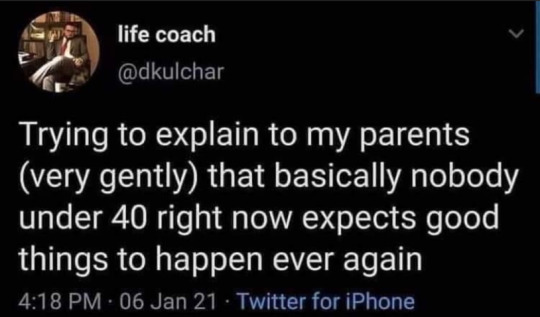
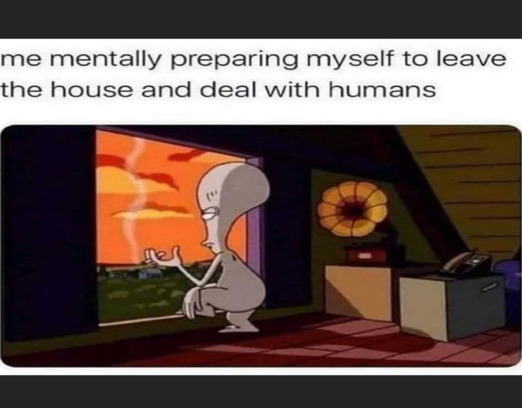
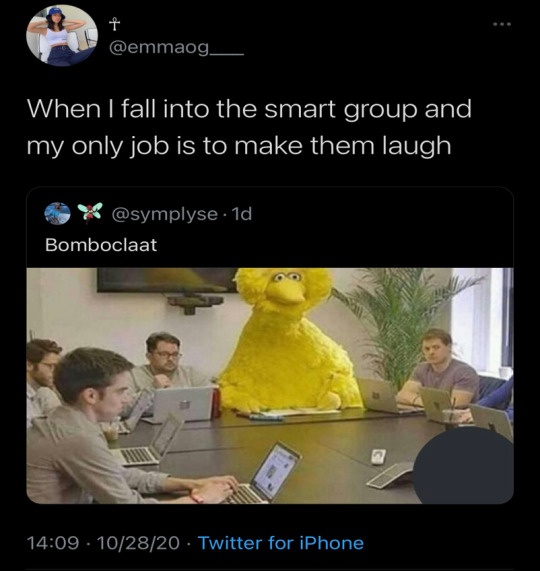
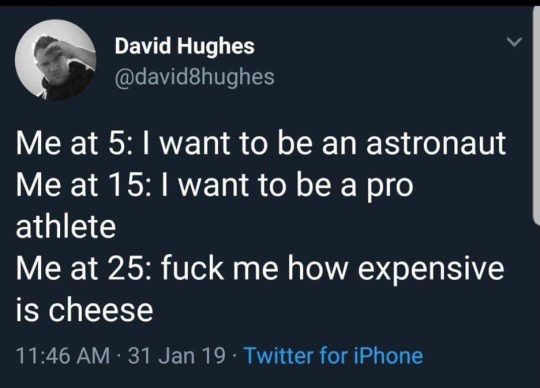
Life is truthfully meaningless if you think about—but it is what you make out of life that truly matters. What we think and the narratives we tell ourselves impact us in every way possible on a daily basis. Scrolling through Instagram is depressing because you are forced to see what everyone is doing/thinking/saying. It is constant bombardment of emotions that change with each second, each post/story seen. It is also a constant state of judgement of others and yourself. Feeling like you are never enough or as if you’re on the wrong path. We have become machines of overwhelming emotions. Machines of finding humor in reality rather than facing problems face-to-face. Our emotions have been simplified instead of the complexity of being human.
I am sad. Honestly, this world is a dumpster fire shitshow that is waiting to explode. The ignorance and the loss of wanting to understand one another is draining. We are being fed emotions but aren’t able to process our own feelings; trapped in the illusion of sadness. How will the children that are currently being raised on TikTok feel in the future? This thought makes me depressed. I am lucky that I had a childhood instead of being a ‘tablet kid.’ I posted a lot of stupid posts as a teen on Facebook that I know I will regret, but at least every form of interaction of social media/platforms wasn’t fed to me through an algorithm. At least I would scroll for hours on Facebook, connecting with friends/strangers instead of being 10, having to hear about the toxicity of the world and the news. Kids these days are losing the innocence of being a kid.
At least I spent hours on Youtube, looking for videos of One Direction, instead of admiring family channels at 10 years old. At least I didn’t want to kill myself because I didn’t know how to twerk—and therefore, no guy will ever want me... at 10 years old. What will the future look like if we are being fed emotions? Will there be a society that is unable to handle their emotions? A society who is afraid of experiencing/accepting the lows and highs of life? Will there a future without hope? Is it sadness or emptiness of the soul?
2 notes
·
View notes
Text
AE #2
On March 22, Twitter user @JensenKarp, tweeted a photo accusing Cinnamon Toast Crunch of having pieces of shrimp in his unopened box of cereal. The post went viral immediately which has since generated over 145k likes, 14.4k retweets and 10.4k replies. The story became immediately a thread that I wanted to keep updated on.
I also want to note that the user was already verified before the tweet went viral.
User @JensenKarp tagged both @CTCSquares and @GeneralMills, other users followed—blowing up their notifications to make sure both accounts noticed.
What followed was moment on Twitter that I will never forget..
Social media reps that controlled @CTCSquares Twitter responded in the most ‘business’ fashion after having a further “look” at the questionable culprits by a private conversation with @JensenKarp in the DMs. Their response to the viral tweet was that the mysterious culprits was instead a accumulation of sugar instead of shrimp tails. And even assuring that there is not even a POSSIBILITY of cross contamination with shrimp. They made sure to publicity tweet this, so the public was aware that they were not in the wrong.
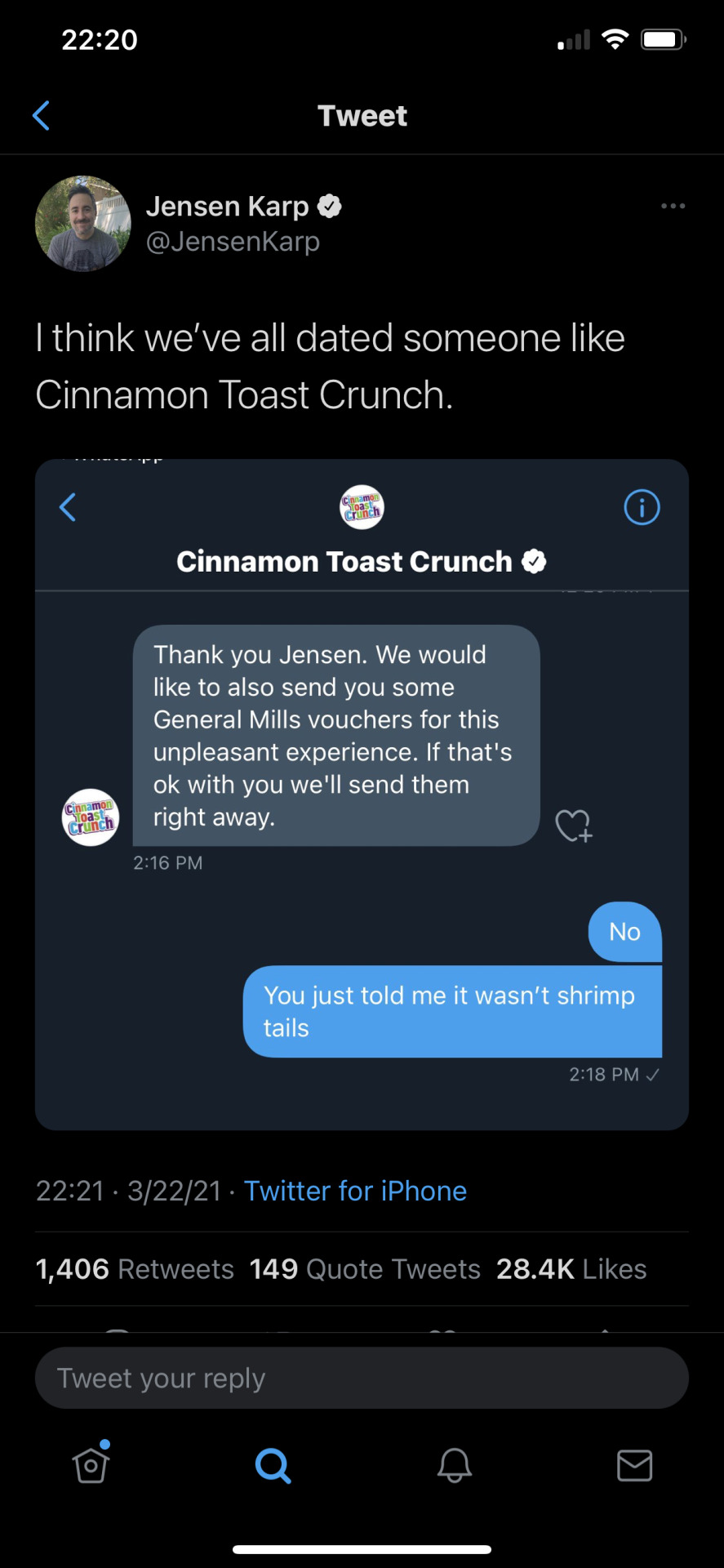
@JensenKarp snapped another picture showing that they were shrimp tails. This moment felt like a comedy skit in real life. The quick and quirky responses from Karp and other users’ is what kept me interested. The spotlight was on @CTCSquares and each reply was miraculously strategic. They were in crisis mode. Scrambling to get the facts together.
To make matters worse for @CTCSqaures, Karp looks further into the bag for other evidence and comes across a piece of string and small pieces of the cereal with what looked like maggots baked on the squares. This situation turned strange and disgusting. The evidence was the furtherest thing from “accumulations of sugar.”
Users were engaged in this thread and also sharing their stories of when they lost trust in the food industry and "experts" chiming in to confirm that it was indeed shrimp.
The interactions between the Twitter users and @JensenKarp had me LOL'ing in real life. I was invested in watching the story unfold in front of my eyes. For at least a day or two, I was checking to see if there were updates. He was extremely clever with the words used and how direct and honest he was with @CTCSquares doing MAJOR damage control, but with total failure. It was a perfect story that mirrored usual corporations responses with customers—unapologetic and lack of accountability. I even shared the story with my boyfriend's family (who I live with) during lunch. They didn't understand the humor and sarcasm, but they were blown away of the possibility of finding shrimp in your cereal box. Sugar-coated cereal, by the way.
Memes began to flood the thread..
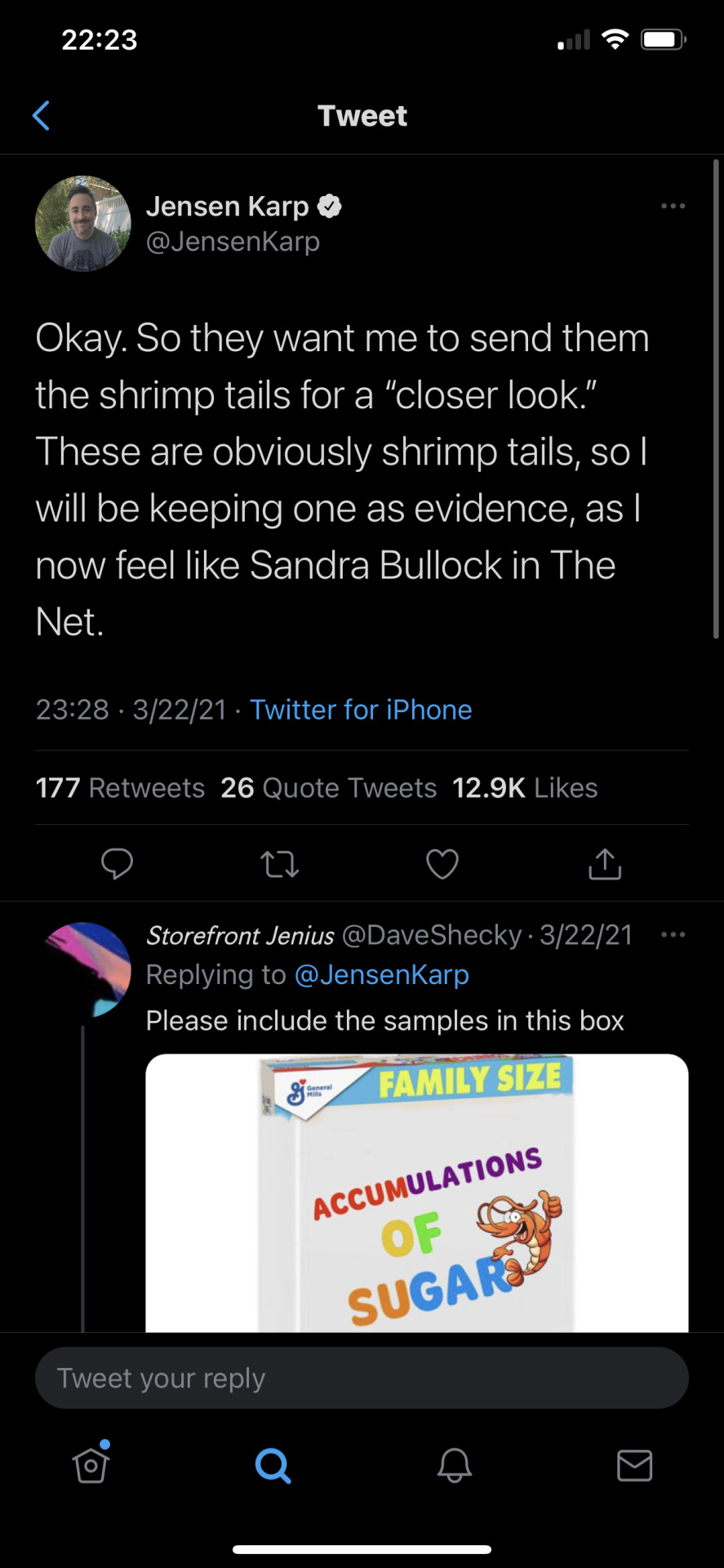
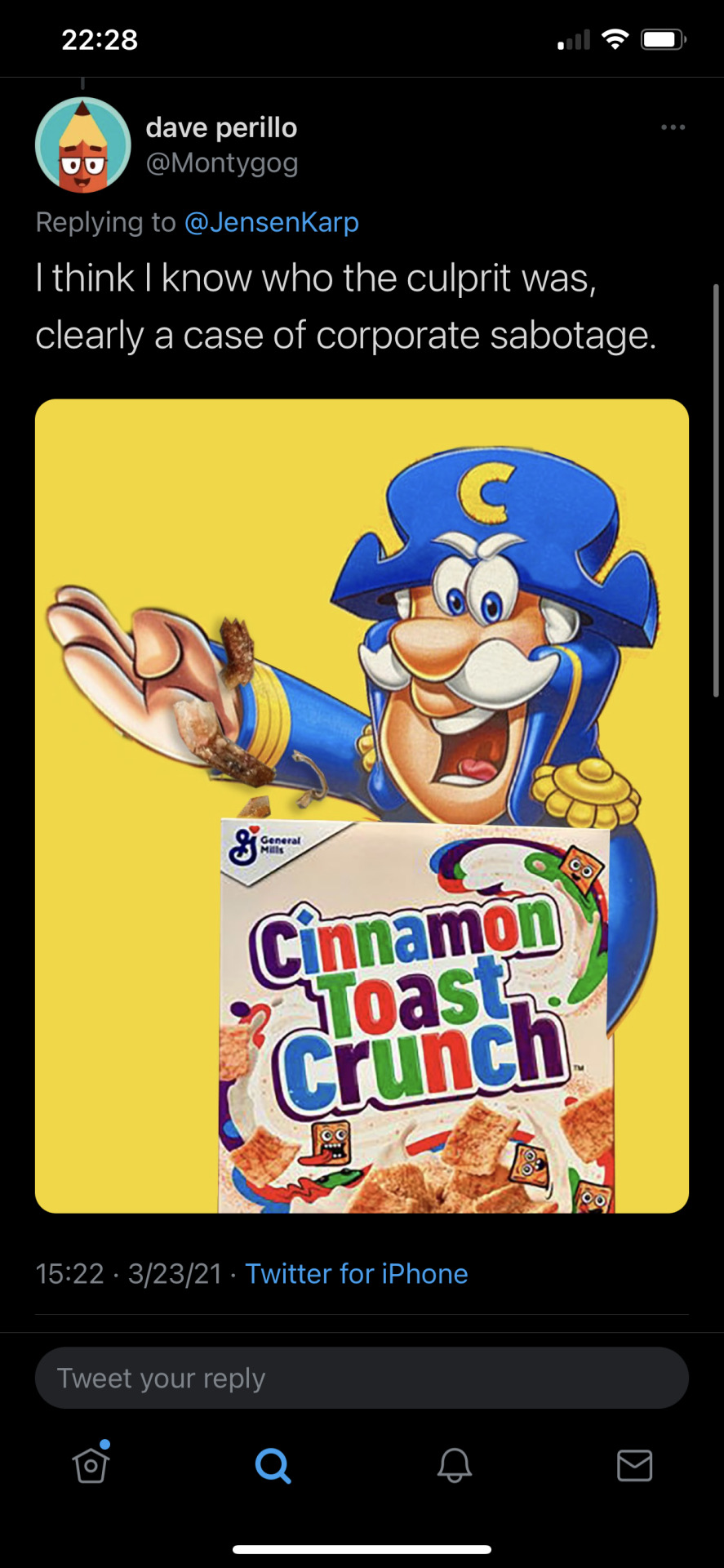
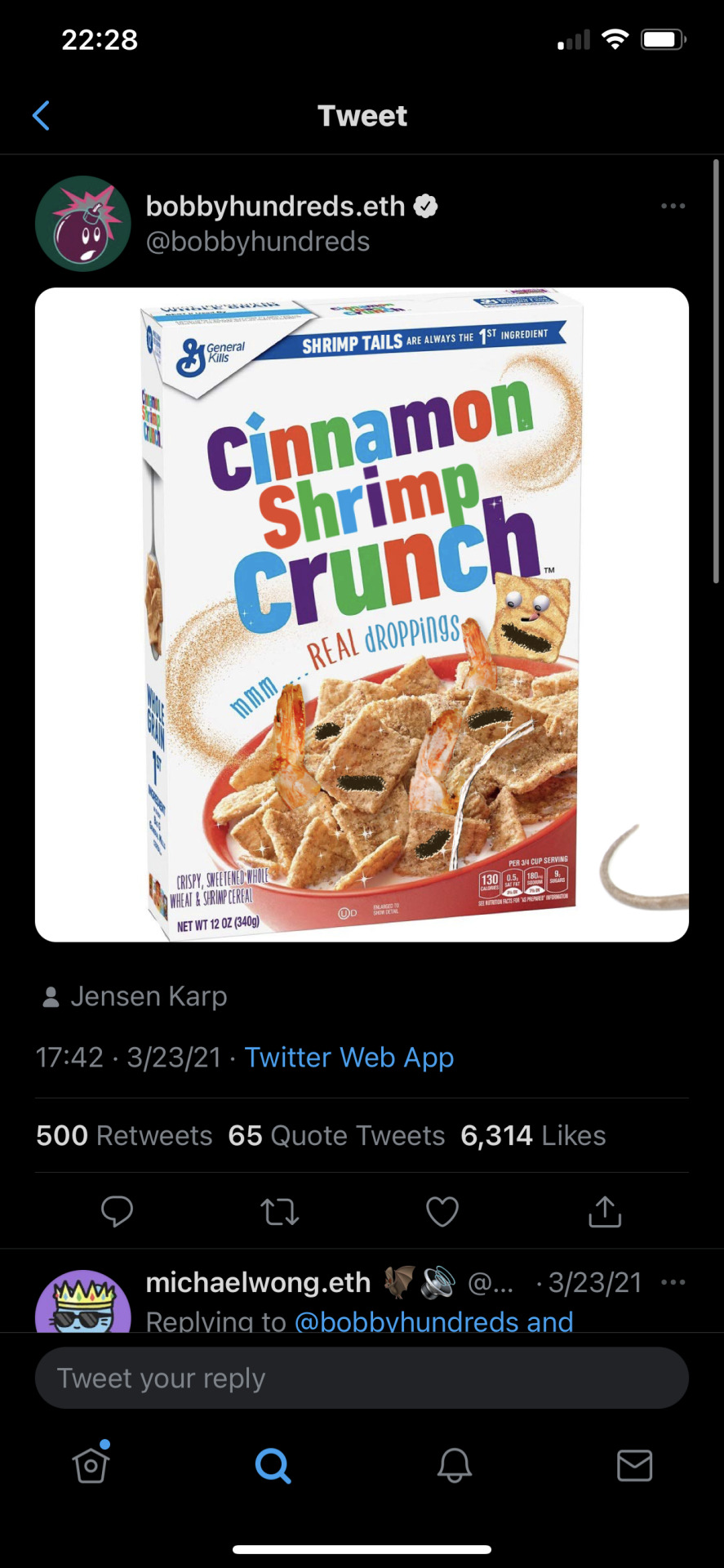
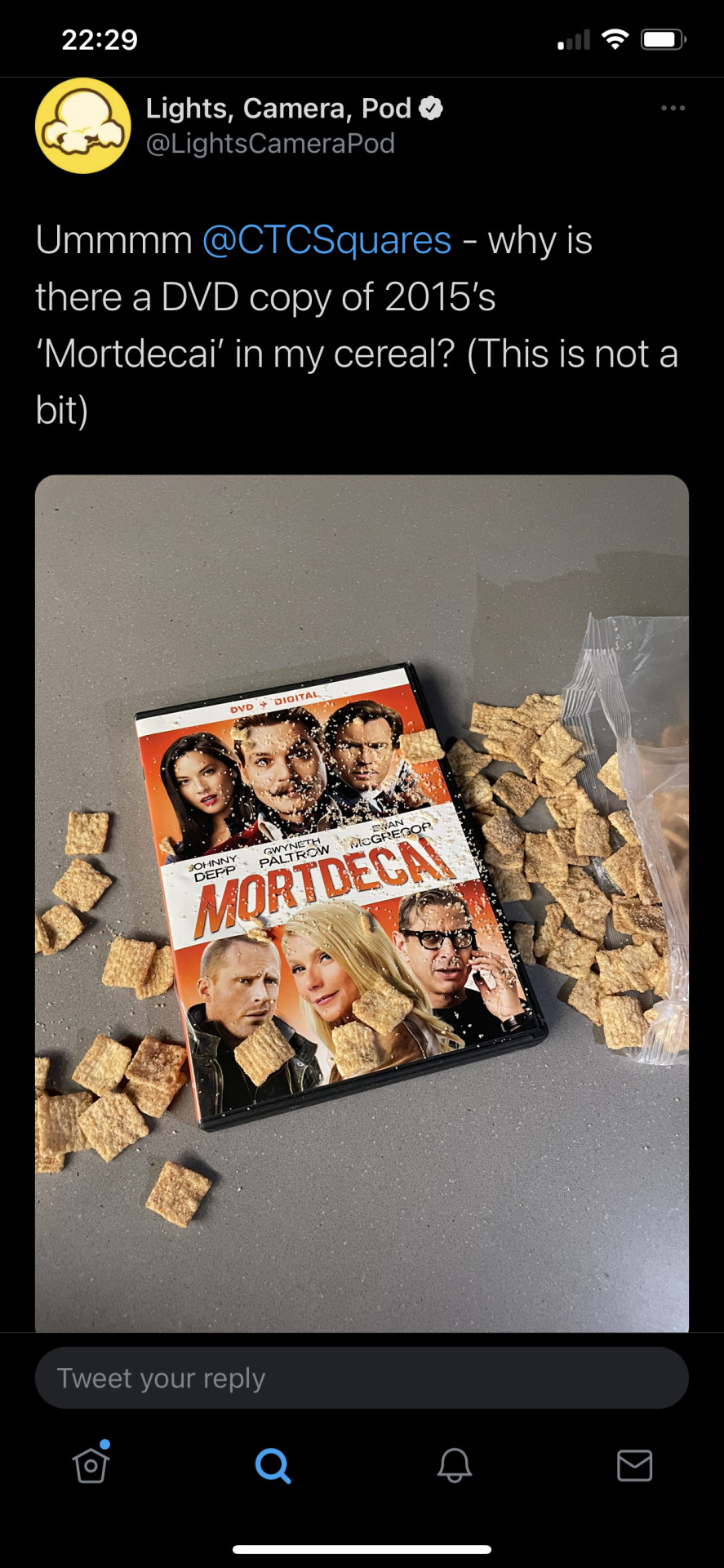
..and @CTCSquares knew that they had to release a press statement.
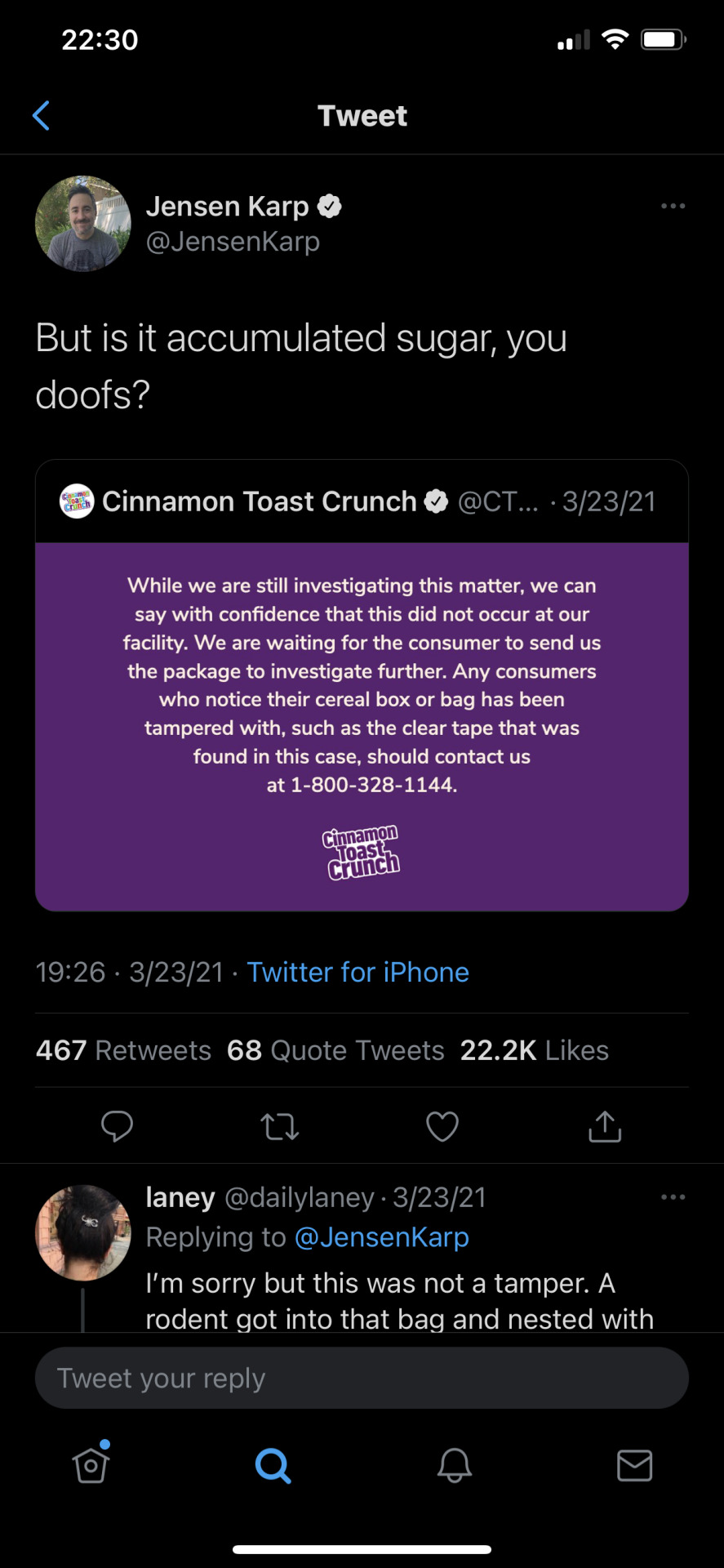
and @JensenKarp kept all us updated!
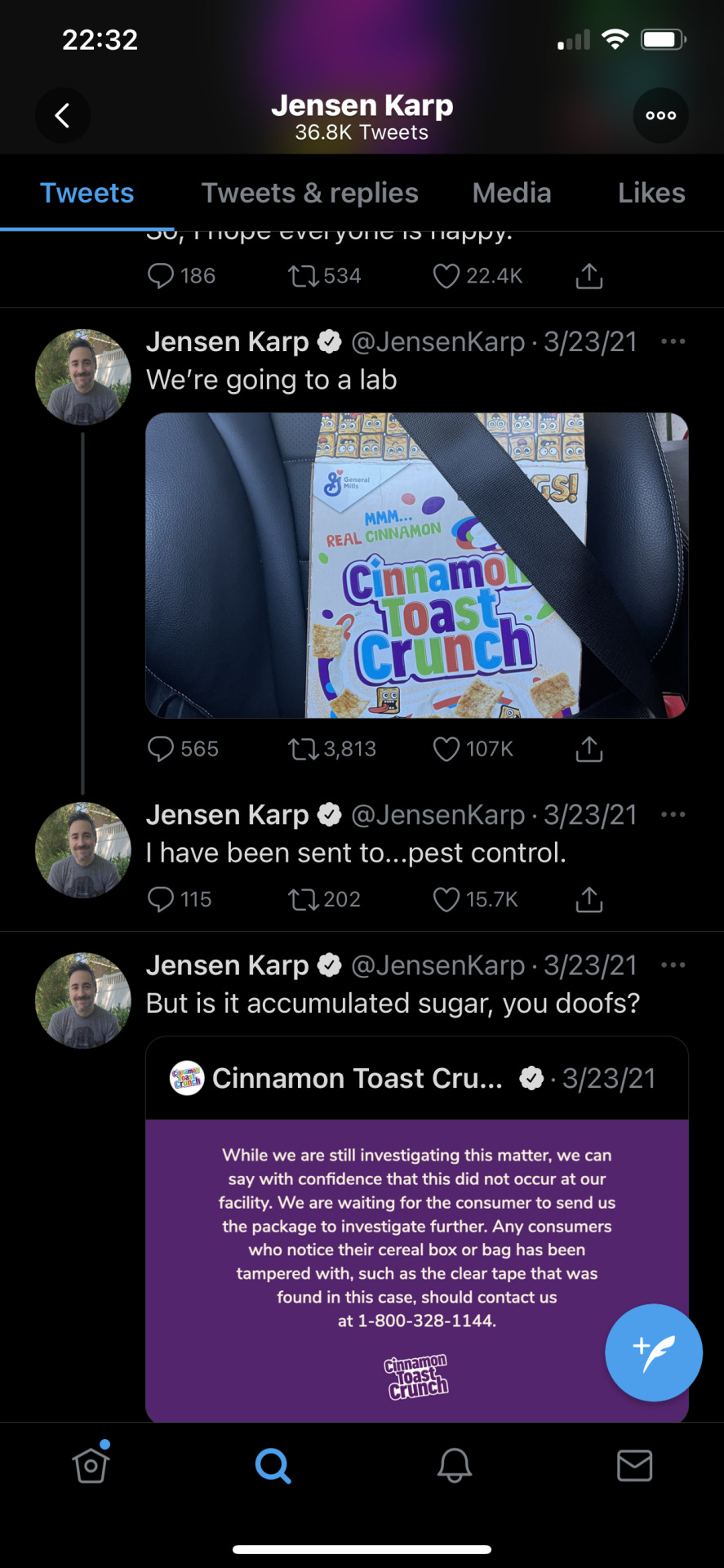
While savagely destroying whatever reputation @CTCSquares had.
and having the opportunity to be interviewed by The NY Times.
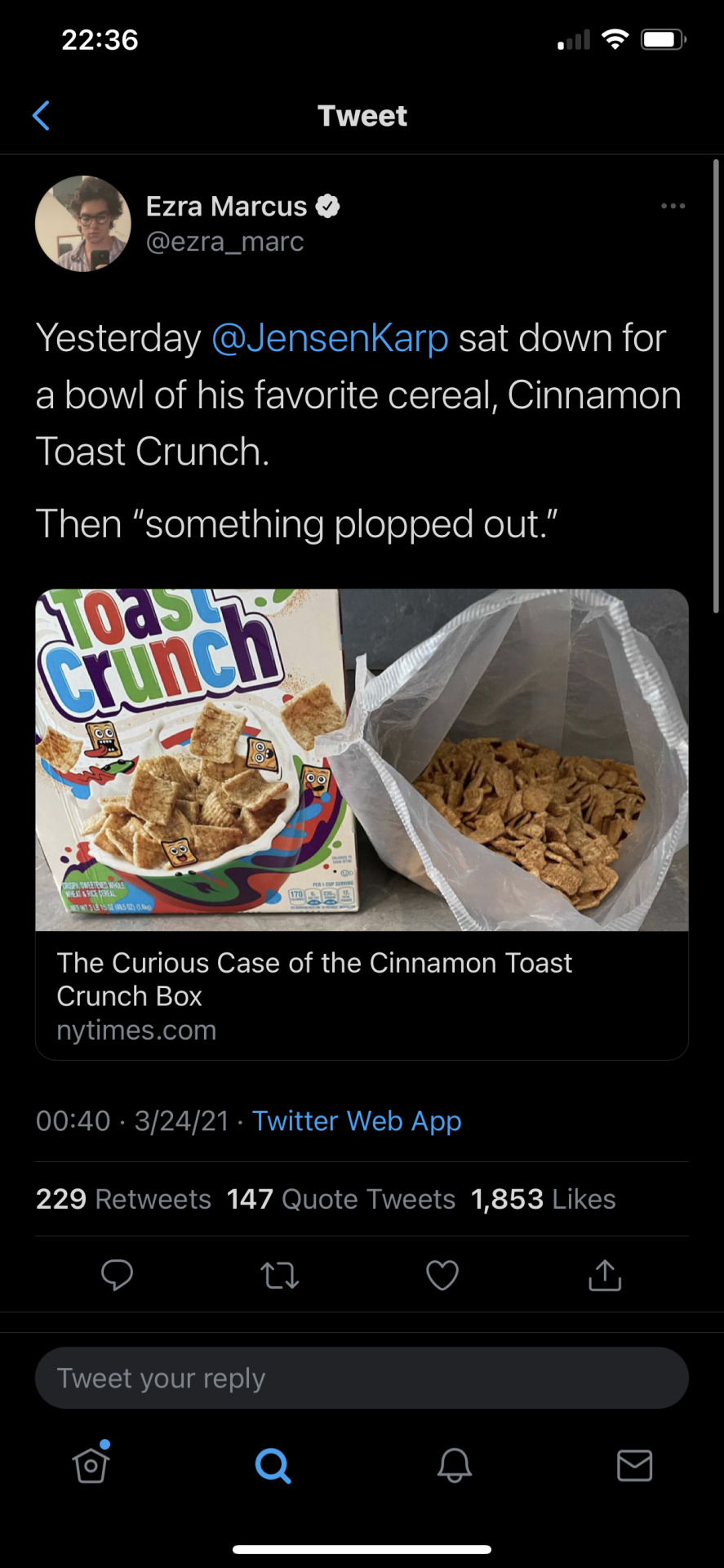
..But like always, the fun can never be enjoyed for too long. Once when people caught on how much attention the thread was receiving over the course of two days, users began to realize that @JensenKarp was the husband of Danielle Fisher (Topanga Lawrence from "Boy Meets World").
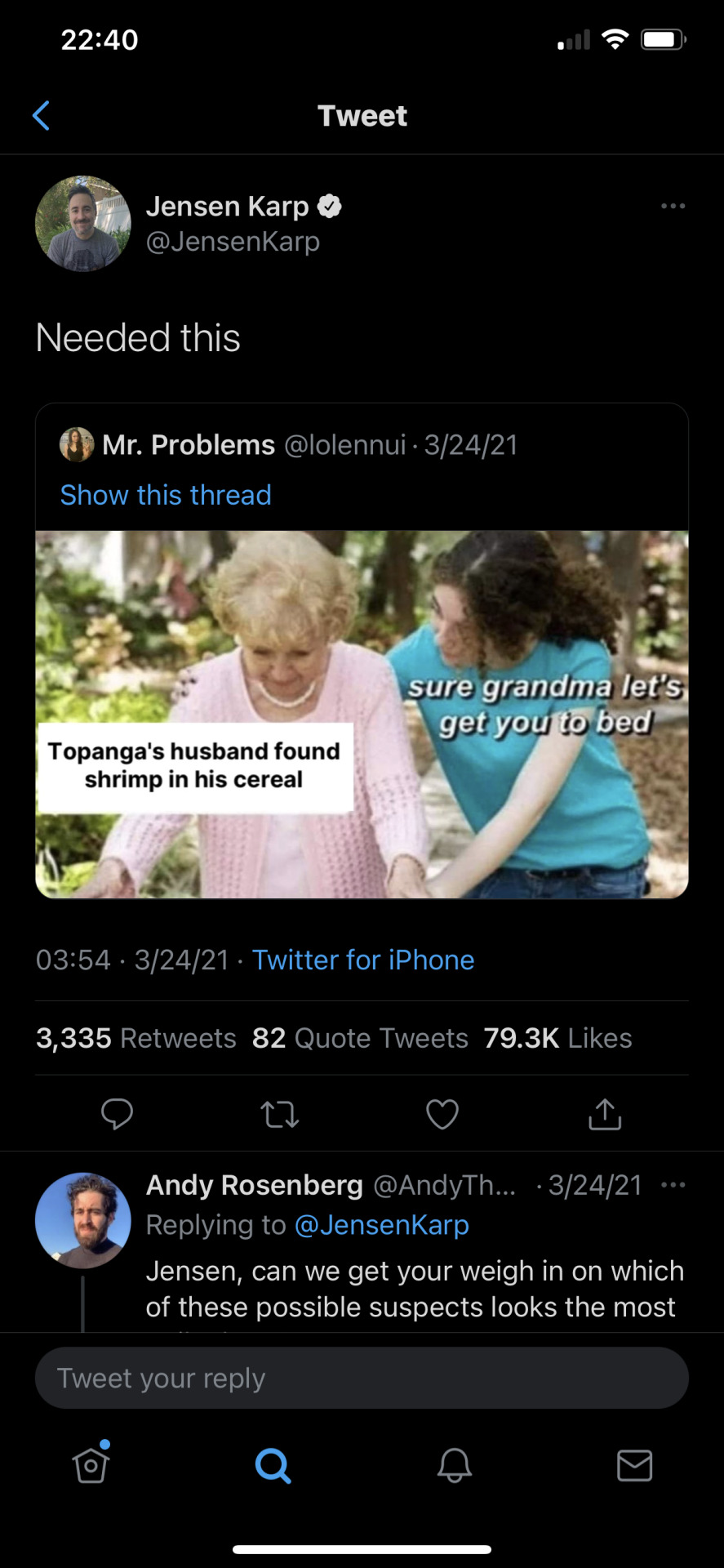
The joke took a dark and unexpected twist when multiple women accused @JensenKarp of emotional and sexual abuse. Melissa Stretten, a writer and model, posted her thread detailing her experience with Jensen. Stephanie Mickus, a screenwriter, shared that Jensen told her to "be careful or I would never work in this town again."
The experiences shared by these women were a disheartening reality of the modern world that we live in. It felt like the joke was ruined. Over six months later, Jensen still has to acknowledge these accusations. After the women spoke out, he hasn't updated his Twitter page. NOTHING. The funny thread was over…. with no real update after over six months. Was this exchange real or just for hype? Who knows..

1 note
·
View note
Text
Auto-ethnography #3
“any swipe can change your life” -Tinder’s motto.
It would be a lie to say that Tinder didn’t change my life.
Thanks to Tinder, I met my partner over two years ago and we have been together since (two years and five months to be exact). In fact, our anniversary date is the of the date we met for lunch after messaging each other briefly. Like when we first matched on the app, it was instant connection. A feeling of knowing that the connection we had, couldn’t be found with anyone or anywhere else—even on the app, where you can set your location to anywhere in the world. Thanks to Tinder, I not only met my match, but also the person who I call my “soulmate.” Whether you believe in soulmates or not, the connection I have with him is like no other. I feel like i have known him for a thousand years. With how much I have changed since over two years ago, it is a scary thought to think that without Tinder and him being on holiday to come back to his home in Rome, would I be the same woman I am today if I had not met him? It is a scary thought that an app had this much power in my life.
I have met some of the most amazing people from Tinder. Whether we continue to talk or not, the experiences and lessons that I have taken from my time of using the app, I will cherish and never forget. I have also met some of the worst human beings on the planet. Situations that I put myself in and now think to myself “What in the world was I thinking?”, a genuine concern for my safety and wellbeing but I was naive. I saw the good in technology. I never used Tinder for a goal of sex, only to cure my boredom. Reading David’s and Cambre’s essay made me realize how I used Tinder like a game. But rather this game was about feeding my ego. How fun is it that you can download an app, upload your best/favorite pictures of yourself and only have to swipe left or right to match with someone. In less than an hour, you have the possibility of creating plans every day of the night—if you want.
I absolutely do NOT miss Tinder, but I do have to admit that I miss the instant gratification of feeding my ego. The feeling is the same as when you are playing a video game and find a secret chest filled with XP points and money. It is dangerous to view dating apps as a video game. It further penetrates the reality of living in a simulation. What will happen to society if everything that we know is incorporated with a gaming experience?—especially human interaction. Although the game of Tinder isn’t to find a secret chest, but rather a continuous stream of unlimited options. It is the intersection where sex is as easy as ordering a pizza and the idea of love as an object.
I don’t think it would have been possible for me to meet my partner without Tinder.
He was working/living in Bologna at the time and was only in Rome for 3 more days, on the day that I met him. What would have happened if I accidentally swiped left? I didn’t have a subscription for Tinder for the possibility of ‘undoing’ my skip. If I had skipped him, i am sure i would have thought “well damn, I hope I see him again on my suggestions,” because often times, the same people would be suggested for you.
The swipe in fact did change my life, like Tinder’s motto. And if I had swiped left, my life still would have been changed because the connection and love that my partner and I share is a reminder that 100% of the time on the app, you have the power to swipe on those who you could have great LIFE CHANGING chemistry with.
0 notes
Text
Auto-Ethnography #1
Lovink’s essay made me reflect on how we are no longer living in real life. What is real life? Technology has made us lose touch of our souls and what purposes we may posses. There are infinite realities which feels like humanity will never find common ground.
Time feels like its multiplying by each week. New technologies implemented in society, where we are trained to see the good first and the bad after it is too late. I have immense fear about the future, but I am aware that this is how every generation must have felt. I would assume those that were born in 1910 must have thought the world was ending—having to endure WWI, WWII, and economic collapses. My generation is extremely privileged, which concerns me. We are baby fed with the comfort of not having to worry. But we should worry because the danger is hidden in plain sight. We are losing touch of humanity and are turning into mind-controlled robots—looking for the next fix.
I feel like a guinea pig in an experiment.
A tester for the next generation.
Looking back at my notes, I am always looking at what other people are saying and basing it off of my ideas—looking for validation that i am not alone in my thoughts. While reading what other people say can create knowledge, it damages your self-thought. I find it extremely hard to get my thoughts out of my head, but it is hard to find the words to describe how I am truly feeling. Reading online gives me those words, but I never retain them. It feels like a mind-swipe. I am no longer in control of my mind. Has society lost control of the collectiveness of true selves? Maybe this is why it feels like a great black cloud of doom.
Reflecting back on the beginnings of my use of social media, I never commented or replied to posts—Unless posting a Facebook status or Tweeting. I am no longer using my voice on social media. Only liking posts, retweet/repost, or screenshots.
I have no voice in the space that I enjoy the most. This makes me reflect on using my voice in real life.
0 notes
Text
Self Tracking #1
Wake up in the morning naturally, without an alarm.
Check either Instagram or Twitter first after preparing a coffee. Lately my routine has been checking Instagram first
When scrolling instagram, i usually never like photos unless it sparks my deep interest, makes me laugh, or is a friend of mine.
After spending 3-5 minutes checking instagram, i switch to Twitter. The first thing i do is to check the trends in the USA. I do this every morning to see if there is something important that i missed. I started to do this after the scare with US vs Iran in 2020, where the first trending topic was the possibility of WWIII.
Scroll through twitter. After 9 years of having my old twitter, i had to create a new one this year because i forgot my old password.
My twitter content now is mostly comedy, memes, funny threads, content that mutual’s post, and news.
I don’t usually like posts (typically only memes)
After checking Instagram and Twitter, I get ready to leave the house to catch the train
While walking to the station, i use Spotify to listen to music on the train and while walking from Termini to Trastevere. I don’t usually check other social media on the train/while walking because on the train; 1. the service is horrible 2. while walking, i don’t care to check social media. I will only text my boyfriend on WhatsApp.
I deleted the Google app and no longer use Safari on my phone. Instead, I’ve replaced it with DuckDuckGo.
My activity that i do daily is check CrazyDaysandNights.net which is a gossip site that reveals gossip blinds of celebrities. I check this website because it is fun trying to guess who the blinds are about. There are also regular commenters who join the conversation. This is the best part because a lot of the time, the comments are absolutely hilarious. It is up to YOU to take things seriously or with a grain of salt.
There is a community on the site who enjoys seeing the truth in the PR simulation of life that we know of today in celebrity culture/entertainment industry
I also use Snapchat to check the DailyMail at 2pm. I know that the DailyMail AKA DailyFail is trash, but the headlines are usually shady and hilarious. I just check this to see the daily bs news. A lot of the time, the answers to the gossip blinds can be found on DailyMail or other socials. I try not to discuss what i read on this website to the "normal" person, because it is purely gossip and i know that the average person may not understand that the entertainment industry has the biggest facade of all time.
It is important to note that now the site has been infiltrated by Qanon and pro-trump maniacs who like to instigate their theories in the comments.
Before going to bed, I check Reddit for the majority of time (1 hour or 1 hour 1/2). I don’t upvote/downvote anything, but i do spend the majority of time reading comments and seeing what people are saying/thinking. I like to hear the opinion of others online and offline.
0 notes
Text
Week 1 Auto-Ethnography
If I had to be honest, I miss TikTok.
But the truth is, is that TikTok is a drug. It will feed every human desire and then suck the life out of you. Only until you leave, will you be able to breathe a fresh breath of air.
I don’t miss TikTok itself, but I miss not having to feel like I am “working” on social media to find the content that interest me or could feed my interest. I miss not having to go back-and-forth between apps to keep my attention. I miss content coming to me instead of me searching for it. I miss the sense of community.
I’ve replaced this feeling with Reddit, but even then, I am constantly working to find the content that I want to see.
Deleting TikTok is like deleting a “friend” on your Facebook friend’s list—you think you will miss out on something important that they’ll post, but when you delete them, you’ll forget, and frankly, who the h*** cares that Tiffany got her heart broken again from the same guy because she can never learn from the same mistakes. It’s incredibly unhealthy and brings a question to my mind if the human brain is even capable of processing/keeping up with our desires that are interwind with technology. Before I deleted TikTok, I was convinced that I would never delete the app. There has never been an app that I have used that could keep my attention for 5 consecutive hours. Never an app that I felt connected with. It was as if it knew me better than I knew myself.
I would call myself self-aware. How does TikTok influence kids/teens nowadays who don’t even know who they truly are. It is difficult to stay in the same place after you graduate high school and hope to find your true self and passion. You have to leave. There is an entire generation being raised on TikTok; Raised on TikTok/social media more than what their parents are teaching them. Thirteen and Fourteen year old’s thinking that they have the world figured out and validating their beliefs because of the algorithm and influence of peers..
1 note
·
View note
Text
Viral videos
What makes a video go viral? Are there certain characteristics? Or is it just luck?
Jenkins and participatory culture
Christian Fuchs in Social Media: A Critical Introduction explains how participatory culture sets the possibility for society to create its own culture rather than to be influenced while also contributing to making society more democratic.
He mentions scholar Henry Jenkins, who notes that a key component of “social media”/”web 2.0” is that it consists of spreadable media by consumers. Consumers are the reason that the content spreads across the internet on all platforms. Without consumers, how would a viral video posted on Youtube, start trending on Twitter? Jenkins calls this model of consumers “grassroots advocates” who spread material that they closely relate to or is socially validating to them.
As consumers in a capitalistic society, we have more power in the operation of brands than we realize. Yes, we are exploited most often, and business are the ones who usually most benefit. But through the spread of viral content, our voices can be heard, and it is up to the brand to listen to their audiences. It can range from inspiration, ideas, criticism, or when a brand faces accountability. More than ever before, consumers are the voice of reason and feedback.
Viral videos
Jean Burgess in “Video Vortex Reader: Responses to Youtube” explains how profitable in a marketing approach of online social networks and user-generated content are. Burgess describes the term ‘viral video’ as a “phenomenon” where video clips gain popularity and massive amounts of views through the spread of such media by users on the internet. It spreads like wildfire—unable to be contained until the ‘hype’ dies down—until we move onto the next thing to obsess about. The term ‘viral’ is more than a marketing approach but also helps us better understand the intricate characteristics of participatory culture online. In these days, going viral can get you a job, followers, money, and the attention from millions on the internet (a process that most would do anything for). Going viral has led to desperation. To seek the validation from others that you are in fact funny or smart. There’s even some that had no intention of going viral—they just did.
Growing up in a racist town in Upstate New York, I spent most of my free time during middle-school on the internet; Sharing funny videos online with my friends (the 2 friends that I had lol) by posting the links to their Facebook page, spending HOURS (literally…hours) watching videos on Youtube of One Direction, and obviously spending hours…..and hours…. On Facebook. In school, my friends and I would always discuss the videos we would share with each other and constantly recite the parts we found the funniest. I was probably around 13-14 participating in a culture that I didn’t understand, yet alone imagine how it would’ve evolved in the future.
youtube
I experience nostalgia when I watch the viral video “Shoes” by comedian Liam Kyle Sullivan, performed by his ‘alter’ Kelly. As a child, this video spoke to me. Not only was it a song solely about shoes, but back then—we thought it was the funniest video possible. Watching it as a young adult, the vibe that I get seems like the “I Want It Now” scene from Willy Wonka & the Chocolate Factory. But this isn’t important—the important thing is that the viral video “Shoes” made Liam an internet legend (he also became a respectable figure in pop culture). Type in “Shoes” in the search bar on Youtube and the first video after 14 years will still be his. It’s undeniable how much this video impacted internet culture. The video has been viewed more than 68,000,000 times. The video is culture. So much so, that Liam portrayed Kelly in the VH1 TV-special I Hate My 30’s. Kelly was also featured in music videos and even won the 2008 People’s Choice Award for “Best User Generated Video.” Not to mention the countless amounts of people that will share his videos to future generations.
youtube
The second viral video (my personal favorite) which I found on Twitter is a video that I can remember word by word, called “Why You Asking All Them Questions?” (intro ends at 1:38) performed by Spoken Reasons and Emmanuel Hudson, it’s a song performed by Emmanuel in both the girlfriend and boyfriend character that shows how many questions women ask their boyfriend when they’re not around. It’s hilarious and without a doubt relatable—especially in black culture. I could go 7 years without watching this video and still remember every bit. Posted orginally on Youtube in 2012, I found the video while it circulated on twitter.
What made this video viral? Without a doubt it’s the perfect re-anactment of a POC couple arguing. The facial expressions…everything. Not to mention how good the flow of the song is. I could listen to the song for my own enjoyment. Not only do we get to hear the side of the girlfriend but also the boyfriend. Nine years later, I watch this video and still laugh. It’s an internet goldmine.
0 notes
Text
Memes in Digital Culture
Memes are a language—specifically a language of the internet. Over the years, I think memes have changed from having a good laugh to using memes as a way of describing your personality or seeking validation that others share the same beliefs/ideas.
Limor Shifman in Memes in Digital Culture compares memes to genes by referencing biologist Richard Dawkins’s analogy of memes being spread person to person through replication or imitation. Similarly, to genes, memes undergo changes, competition, selection, and retention. Memes fight for the attention of users—only the strongest survive. By strongest, I mean the ones who match the sociocultural environment of where the meme originated. The memes cannot keep up with the ever-changing environments and cultural values, go extinct (not viral).
Memetics
The term memetics as described by scholars Francis Heylighen and Klaas Chielens is “the theoretical and empirical science that studies the replication, spread and evolution of memes”—during the 1990’s, many scientists from all fields began to take interest in the study and research of memetics.
There are two controversies surrounding memetics: the “biological analogies” and “who’s the boss.”
“Biological analogies” relates to the idea that there is a strong correlation between memes to both viruses and genes. It takes after the epidemiology model, which suggests there is a cultural equivalence between memes and flu bacilli that is transferred to hosts from sneezes. Looking through the lens of internet culture, you can compare this metaphor to how visible to content is when it goes viral. Henry Jenkins compares this ‘infection’ as a “meaningless media “snacks” that infect their minds.” The second biological metaphor about for memes, taken from Dawkins, is a model called evolutionary genetics. Often seen as a metaphor taken too far, some compare the cultural relevance of memes to other evolutionary concepts such as: genotype, phenotype, transcription, and code. The is model is criticized for the reason that memes behave differently from genes-therefore, we should not reduce culture to biology as it can simplify the complexity of human behaviors.
“Who’s the boss” looks into the idea of human influence in the process of meme diffusion. Contrary to other scholars, Shifman suggests that the undermining of human agency is to the interpretation of memes—not to the concept of the meme itself. Scholar, Rosaria Conte notes that we must look at people as the actors of cultural transmission, not as vectors during this process. Conte states that the dissemination of memes is based on 3 agents with decision making powers: social norms, perceptions, and preferences.
Digitalization of memes
According to Dawkins, memes that successfully spread are composed of three properties that are all enhanced by the internet:
Copy fidelity- it’s accuracy in communication through other medias.
Fecundity- the number of copies in a given timeframe.
Longevity- How long the meme is able to maintain its popularity
Overtime, the general idea of a meme has transitioned into a concept that best reflects some of the fundamental aspects of the internet. Shifman says that Dawkins couldn’t have possibly imagined this back in 1976.
Internet memes and Web 2.0 share three main attributes:
1. A steady dispersion between individuals to society. Although memes spread on a micro-level, they play a huge part in shaping sociocultural values and behaviors. What starts out as a meme being shared person to person, can have a great effect on the behaviors and attitudes of society.
2. Reproduction of memes through copying and imitation. Memes are constantly changing their style and content—this is called repackaging mechanisms. There are two repackaging mechanisms of memes on the internet: mimicry and remix.
Mimicry is the recreation of other texts through imitation.
Remixing is the process of manipulating the original image by using technology-based manipulated such as, Photoshop or adding a new soundtrack.
3. Go through a process of competition and selection.
Hypermemetic logic
Shifman defines hypermemetic logic as the process of sharing, imitating, remixing, and using tools to measure its popularity as a huge tool of participatory culture. “Hyper” isn’t just limited to how memes are spread easily as ever before, but also its evolution in both the digital sphere and non-digital world. Shifman states that “hypermemetic” offers a depiction of a culture where memes have a multidimensional presence—both online and in the real world, we can use memes as a form of expression or purpose.
Why do people make memes?
Shifman states there are three reason for what drives people to re-create videos and images:
1. “Attention economy”-In the attention economy, it's not important that value of information, but instead, the focus is on the amount of attention that people pay to it.
2. Social logic of participation or “networked individualism”- This is the idea that there is an increase of individualization where we are expected to create our own sense of identity and image, to further divulge a sense of “selves.” Simultaneously, individuals contribute to the shaping of social networks which demonstrates the human desire of communality.
3. Cultural and aesthetic logic of participation
Most recently, there as been a dramatic shift in meme culture with the rise of social media platform TikTok. The virality of memes is no longer solely restricted to image or video formats, but TikTok has now inverted the traditional meme format—focusing on memes that incorporate music. Each user is able to add their own take on the 5-15 second song, giving each TikTok its own unique take on the meme. Whether it’s a personal story, a funny memory, or even a strange fact—there may even be thousands of videos with the same sound—TikTok has even transformed the way we share stories, even if it is your most cringe-worthy moments.
I think TikTok has paved a way for memes to be incorporated in our daily life without the use of images or videos. I always hear people on the train scrolling through TikTok. Most recently, I heard the "Oh No" trend, where people share their "Oh no" moments. I will never know what video that person watched, but I think of the funny videos that I have seen with the same sound. It's also important to mention that the person doesn't need to have TikTok to see the videos. Often, viral TikTok's are spread across all platforms that generate more engagement of users by the use of likes, comments, and shares.
0 notes
Text
Platform Cooperativism
Sometimes I find myself in a rabbit hole of stalking the profiles of die-hard MAGA fans Instagram posts and constantly see their support for Capitalism. In fact, this morning, I saw a post of a woman holding a sticker that said: “It’s okay to be a Capitalist.”
Oh how much I wish I was joking…
What is so good about Capitalism? Is it the exploitation of human labor? The fact that there’s enough resources for everyone, but millions of children die each year from malnutrition? Do you like to work long hours in shitty conditions to get paid barely nothing to survive each month, while your CEO sits on a gold throne with a net worth of $5O million?
Capitalism has done nothing but divide us and ruin lives and has even manifested itself digitally into what we know as Sharing Economy. Trebor Scholz in “Platform Cooperativism: Challenging the Sharing Economy,” discusses the consequences of the sharing economy and also a new approach called Platform Cooperativism.
Sharing Economy
There is no doubt that the Sharing Economy makes our lives easier and allows us to “save” money with low prices and deals. Some do not realize the power that we as consumers have. Uber put the taxi industry on its knees. Why? By offering the same service as a taxi but at a lower cost and has adapted to a new generation. The reality is that there isn’t a physical infrastructure that is the sole purpose of keeping the $$$ from coming in. It’s us. Without us playing the middleman between Uber drivers and Uber, they would fail. They exploit and profit off of the labor, emotions, home and time of those who drive for Uber. Scholz uses the slogan “What’s Mine is Yours,” to describe how there is an illusion that the grass is greener on the other side, but in turn, they will exploit any chance that they can get.
Activist Micky Metts said: “When building platforms, you cannot build freedom on someone else’s slavery.”
Platform Cooperativism is the digital system that is needed to replace the toxic working conditions and ideology that the sharing economy brings. People call America so great, but what country is great when over HALF of the country is making less than $30,000 a year and where 76% of the country doesn’t have a savings. How are we supposed to plan for the future? As an American, I feel as if my generation was raised to not think of the future, but just survive. They will tell you to think of the future, but how? Living with your parents until you’re 30 just so you can pay off your debt? America is only great for the powerful and rich. In order to address issues like minimum wage ( $7.25 since 2009!!), safety, health insurance, pension, there needs to be a structural change that happens to introduce more democratic principles.
There are three parts platform cooperativism has:
1. Replicate the technological heart of Uber, Task Rabbit or Airbnb. The technology is being embraced but under ownership of democratic values. That the heads of the company are not the only one benefiting.
2. Relies on solidarity.
3. Built on innovation and efficiency that benefitsall, not only profit for a select few.
Scholz introduces 6 different types of platform cooperatives
1. Cooperatively Owned Online Labor Brokerages and Market Places
2. City-Owned Platform Cooperatives: This allows those in cities to play a larger role in the regulation of economics and as well shaping it.
3. Producer-owned Platforms: We as “produser’s” fight back against platforms like Facebook, Spotify, or Netflix that have monetized themselves completely. We come up with our own form of these platforms.
4. Union-Backed Labor Platforms: Those in unions or taxi drivers working together to fix a specific sector.
5. Co-operatives from Within: Worker cooperatives forming inside the heart of the sharing economy.
6. The Platform as Protocol: Peer-peer interactions aided entirely by protocols with no central point or main goal derived purely based on profit.
0 notes
Text
Data colonialism
Who would’ve thought that the invention of the internet less than seventy years ago, would bring back the topic of imperialism? In such a short amount of time, it feels like a new world. We can no longer fathom life without the internet.
As a teen, I would categorize myself as a rebel. The idea of me being on the internet frightened my parents. Little do they know how invested I was. Although still in use in some countries, I remember having to text a number to tweet before the use of smartphones. It was during this time, when you could post anything on Instagram that interested you. Your favorite quote, a pair of shoes, or your sandwich from Subway. There wasn’t pressure of maintaining aesthetics or trying to take the best photo for the most likes. You posted what you wanted to post.
So how does this relate to algorithm? The point is that when I think about this period (2009-2011), I feel nostalgic. I don’t think that during this period, we as users would’ve thought about the possibility of us being exploited for profit and specific motives. But maybe this idea was in fact there all along, just never implemented.
My first post, I mentioned that history always repeats itself. But is that true? Maybe the real answer is that rather than history repeating, its us as humans who repeat the same behaviors.
The core of imperialism functions by searching for: territory, materials, and slave labor for work. Rather than looking for raw resources, we have entered a world where there can be profit made from our data for the purpose of economic value. Dan M. Kotliar in Data Orientalism: On the Algorithmic Construction of the Non-Western Other, he states that data colonialism is the combination between the practices of colonialism while using the methods of computing. Kotliar credits scholars Couldry and Mejias on the idea that the spread of data colonialism is both external (geographic) and internal (social). Data colonialism is constantly searching for new “territories” to expand its “algorithmic eyes.” Capitalism, which is based on the exploitation of workers, is closely related to data colonialism, but it’s important to note that it further perpetuities the expansion and exploitation of human life. Kotliar insinuates that humans are becoming the “raw material” that reflects colonialism’s long history of exploitation. And the scariest part is that we know this. We know we are being exploited, yet we still continue to live about our lives and use these apps/platforms because we ‘need’ them.
Extractive Case-study
Kotliar shares the story of a case-study for the Israeli based start-up company. He uses this example for supporting his idea that algorithms can be used to further construct the idea of the Other. Extractive is responsible for providing user-based profiling algorithms to telecommunication companies in East Asia. By categorizing and understanding their users by the use of user analytics, companies have the possibility of better understanding their customers. As most customers still use prepaid SIM cards in East Asia, their data remains unavailable to these companies. To solve this problem, Extractive is able to gain access to users’ Facebook accounts and as well as their phones by having them use their Facebook credentials to log in onto their app. This allows Extractive to take their data unknowingly and sell it to telecommunication companies for a profit. By using this data, Extractive is able to create user profiles that turns anonymous customers into an understanding of the person. The customers become identifiable. Later, these profiles can be used by telecommunication companies to better understand and support with better offers. The end goal is to have “loyal” customers. One way to do this is by the improvement of personalized offers, services, contents, or prices. Instead of using the content that the user’ posts for data, they use the metadata which can be defined as the data extracted from the data. An example of this would be the Index in a book. Kotliar describes metadata in this case as the “Inter-cultural bridge” that allows Extractive to access East Asian users’ data right out of their hands without them knowing.
While reading this article, I couldn’t stop myself from thinking about all of the times I was too lazy to create a profile for something, so instead, I log into Facebook (sometimes Google). This brings me to the topic of TikTok. I’ve always noticed how close I feel to the algorithm of TikTok. It’s constantly updating to my interests. I can tell the algorithm if a video interests me or If I am uninterested. What I see on my feed is personally curated by the algorithm to have me on the app for maximum reach. It knows that I use to be a fan of One Direction and sometimes also have an existential crisis. It knows me. Although it may seem like a good idea for an algorithm to understand you, it concerns me with how advanced this technology is becoming. Our minds are so delicate and easy to manipulate. Especially in this generation. What will the future look like in 10-15 years, if this is how the technology is now? The future is concerning if we don’t set ground rules.
0 notes
Text
Algorithmic Culture
1 egg
1 teaspoon of ground cinnamon
1/4 cup of milk
4 slices of bread
Algorithm is like the french toast recipe above. The first step is to collect all necessary ingredients and then step-by-step, we must follow the instructions carefully to prepare the meal correctly.
In chapter two of Digital Keywords: A Vocabulary of Information Society and Culture, Tarleton Gillespie suggests that we are more inclined to explain the impact of algorithms rather than stating what an actually algorithm is.
what is an algorithm?
The makers of algorithms, will refer to algorithms as a process of steps for organizing and sorting through data to reach a specific outcome. The data that is collected, depends on the rules that you put in place to get to your goal. This is why we can compare algorithms like the recipe for your favorite meal. For its designers, there is a specific model: Give users the top search result pertaining to their interests. Relevancy is measured by a clear basis and understanding of relationships, strategic targets, and threshold indicators of success, Gillespie states. There can be many algorithms that can reach the same result in a given model. The algorithm that is chosen by the engineer is picked based on “technical” values such as speed, system load, and also their computational elegance.
How can we train algorithms?
The result that algorithms produce are never “correct” results, but instead is the outcome of multiple possible pathways. Instead of looking for correctness, algorithm designers look for the threshold of user satisfaction in the given model based on: the percentage of clicks on top results or the amount of correctly identified human faces scoured on the internet from digital images. The end result depends on the elements you give to build the knowledge upon.
As an avid Twitter user, I can't help but think of last year, in 2020, when Twitter users discovered a racial bias of image cropping. My feed had exploded with outraged users wondering why racial bias in tech is still a discussion, especially from Twitter. The issue was that the algorithm preferred to preview the cropped images for white faces over black ones. Twitter’s response to the backlash was stating that the algorithm doesn’t have racial bias, but instead chooses the part of an image that is the most captivating to grab the user’s attention. Users experimented this by uploading a picture of disgraceful Senate Majority Leader Mitch McConnell alongside former President Obama. What image was chosen as the focal point? Mitch McConnell. I certainly would prefer to focus on a picture of Obama instead of Mitch.
Technological Unconscious
I often find myself thinking about how revolutionary TikTok is and how much it has shaped society and our lives in the little time it has gained its popularity. With the pandemic and millions of people staying home, the platform came at no better time. But, at what cost? We’ve entered a period where we don’t question how much these platforms or other tech has influenced our everyday thoughts. In “Power through the algorithm? Participatory web cultures and the technological unconscious.” David Beer mentions new media theorist Scott Lash’s idea of a “new new media ontology,” meaning to describe a shift in the way of living in which our lifestyles and environments are shaped. Information and software are no longer separated from our lives but instead are intervened in our everyday life.
0 notes
Text
Californian Ideology
Imagine the current world without the invention internet.
The internet has developed into what was first used for the military as a product of the Cold War to now as a tool that can decentralize power and spread democracy globally. We can use the example of what is happening in Myanmar, with military Generals shutting down the internet for millions of its citizens. The internet has become a powerful tool to spread the truth and even educate others. For the corrupt, the internet is a threat.
The Californian Ideology was a pivotal moment that transformed the ways in which we use the internet today. An ideology is a set of beliefs and values. Ideology can impact the way we see certain issues and can also have negative connotations.
In Richard Barbrook and Andy Cameron’s The Californian Ideology in The Internet Revolution: From Dot-com Capitalism to Cybernetic Communism, there are two key players that promote this ideology; the hippies and the yippies. The hippies are what we know today as a free spirited, weed smoking, open-minded society, while the yippies are the men in black ties (white-collar). As different as these two groups were, they shared a common interest—freedom. Barbrook and Cameron use the term ‘Jefferson democracy’ meaning that it should be a right to express yourself freely on the cyberspace. Through casual dress, openness about sexuality, loud music and drugs—the hippies refused to conform to societal expectations that had been imposed. They believed that through the convergence of media, computing, and telecommunications- eventually an electronic agora would be created. This is a place where people are able to freely express themselves and their beliefs/ideas without the fear of censorship.
The Californian Ideology is reflected in the methods of market economics and the freedoms of hippie artisanship through the possibility of technological determinism. This is the assumption that technology solely creates and shapes society-not the other way around. We see technology as a god-made independent object.
The hippies and the yippies both believed and knew that the internet was going to change the world. Like mentioned before, the hippies wanted freedom of expression, whereas the yippies wanted freedom of the market.
3 notes
·
View notes
Text
Week 1
“History always repeats itself.”
I remember hearing this in my history class in 10th grade. This quote has stayed with me since.
I had known from previously taking this course that the internet was used originally for military purposes. Now over four decades later, the internet is still being used as a military tool. Questions I often think about are: What is the future of war? Or how has war changed since the invention of the internet?
Times have rapidly changed over the past few years. It is unsettling to think about the future of society considering how much has changed in such a short amount of time. The creation of the internet has blinded reality to many. I had never made the connection that whoever controls most of the cables on the seabed, basically controls the internet. It frustrates me that this isn't basic information that is taught in high school. It is fundamental to educate the next generation about the internet instead of waiting to go to college to study this. War is evolving rapidly with the help of the internet. It is important to address these issues before it is too late.
1 note
·
View note